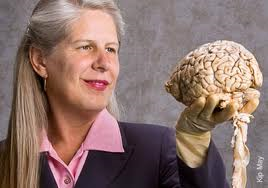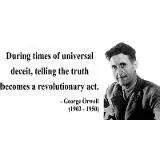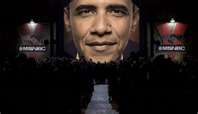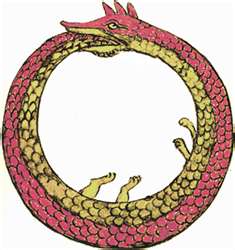In Orwell’s 1984, INGSOC’s totalitarian control of Oceania ultimately depends on Newspeak, the language the Party is working hard to develop and implement. Once in common use, Newspeak will eliminate the possibility of thoughtcrime, i.e. any idea that contradicts or questions absolute love for and devotion to Big Brother. Newspeak systematically scrubs away all those messy, gray areas from the English language, replacing them with a formal, logically-rigid system. For example, instead of having to decide whether to use ‘awesome,’ ‘fabulous,’ or ‘mind-blowingly stupendous’ to describe a situation, you would algorithmically deploy the Newspeak formula, which reduces the plethora of synonyms you could use to ‘good,’ ‘plusgood,’ or ‘doubleplusgood.’ Furthermore, all antonyms are reduced to ‘ungood,’ ‘plusungood,’ or ‘doubleplusungood.’
Syme, a Party linguist, tells Winston, the novel’s rebellious protagonist, that the ultimate goal is to eliminate conscious thought from the speaking process altogether. The Newspeak term for it is ‘duckspeak‘—a more mechanical form of communication that doesn’t require higher-level cognitive functions, like having to pick the word that best expresses your feelings or creating a new one. That sense of freedom and creativity will simply cease to exist once Newspeak has finally displaced ‘Oldspeak.’ “The Revolution will be complete,” Syme tells Winston, “when the language is perfect.” The Proles and the Outer Party (95% of Oceania’s population) will become a mass of mindless duckspeakers, the linguistic equivalent of ‘philosophical zombies’.
Newspeak implies that cognition depends on language—that symbolic communication isn’t merely a neutral means for sending and receiving thoughts. Instead, the words and sentences we use actually influence the way we think about and perceive the world. While Orwell was obviously inspired by the propaganda techniques used by the dictators of his day, perhaps he was also familiar with Nietzsche’s “On Truth and Lying in a Non-Moral Sense” or the work of anthropologists like Boas and Sapir, all of whom embraced some form of what is now called linguistic relativism, a theory which argues for the reality of what Orwell proposed in fiction: we experience the world according to how our language lets us experience it.
Linguistic relativism is on the rise in the contemporary study of language. The work of, for example, Lera Boroditsky and Daniel Everett provide strong empirical data that supports (at least the weak version of) linguistic relativism, challenging the Chomskian paradigm, which posits a universalist account of how language is acquired, functions, and, by extension, relates to cognition and perception.
In my previous essay on the Uroboric model of mind, I asked about the connection between neuronal processes and symbolic systems: how can an abstract representation impact or determine the outcome of tangible physical processes? How can ionic thresholds in axons and the transmission of hormones across synaptic gaps depend upon the meaning of a symbol? Furthermore, how can we account for this in a naturalistic way that neither ignores the phenomena by defining them out of existence nor distorts the situation by positing physics-defying stuff? In short, how do we give an emergent account of the process?
 First, we ask: what is language? Most linguists will say it means symbolic communication: in other words, information exchanges that utilize symbols. But what is a symbol? As you may recall from your grade school days, symbols are things that stand for, refer to, or evoke other things—for example, the red hexagonal shapes on street corners provokes your foot to press against the brake, or the letters s, t, o, and p each refer to particular sounds, which, when pronounced together, mean ‘put your foot on the brake.’ Simple enough, right? But the facility with which we use language, and with which we reflexively perceive that usage, belies both the complexity of the process and the powerful effects it has on our thinking.
First, we ask: what is language? Most linguists will say it means symbolic communication: in other words, information exchanges that utilize symbols. But what is a symbol? As you may recall from your grade school days, symbols are things that stand for, refer to, or evoke other things—for example, the red hexagonal shapes on street corners provokes your foot to press against the brake, or the letters s, t, o, and p each refer to particular sounds, which, when pronounced together, mean ‘put your foot on the brake.’ Simple enough, right? But the facility with which we use language, and with which we reflexively perceive that usage, belies both the complexity of the process and the powerful effects it has on our thinking.
Cognitive linguists and brain scientists have shown that much of our verbal processing happens unconsciously. Generally speaking, when we use language, words just seem to ‘come to mind’ or ‘show up’ in consciousness. We neither need to consciously think about the meaning of each and every word we use, nor do we have to analyze every variation of tone and inflection to understand things like sarcasm and irony. These complex appraisals and determinations are made subconsciously because certain sub-cortical and cortical systems have already processed the nonverbal signals, the formal symbols, and decoded their meaning. That’s what learning a language equips a brain to do, and we can even identify parts that make major contributions. Broca’s area, for example, is a region in the left frontal lobe that is integral to both language production and comprehension. If a stroke damages Broca’s area, the sufferer may lose the ability not only to produce speech, but to comprehend it as well.
One of the most publicized cases of sudden ‘language-less-ness’ is that of Dr. Jill Bolte Taylor, the Harvard brain scientist who, in 1996, happened to have a stroke in her left hemisphere, which impacted both the Broca’s and Wernicke’s areas of her brain. She couldn’t remember who she was. She couldn’t use language. Taylor compares it to dying and being reborn, to being an infant in a grown woman’s body. Her insights into a language-less reality shed light on how words and sentences impact cognition. She says she lost her inner voice, that chatter that goes on ‘in’ the head. She no longer organized her experiences in a categorical, analytic way. Reality no longer showed up to her with the same fine-grained detail: it wasn’t divided and subdivided, classified and prejudged in terms of past associations or future expectations, in terms of self and other, us vs. them, and so on. She no longer had an ‘I’ at the center of her experience. Once the left-brain’s anxious, anal-retentive chatter went offline, right-brain processes took over, and, Taylor claims, the world showed up as waves of energy in an interconnected web of reality. She says that, for her at least, it was actually quite pleasant. The world was present in a way that language had simply dialed down and filtered out. [Any of you who are familiar with monotheistic mysticism and/or mindfulness meditation are probably seeing connections to various religious rituals and the oceanic experiences she describes.]
This has profound implications for the study of consciousness. It illustrates how brain anatomy and neural function—purely physical mechanisms—are necessary to consciousness. Necessary, but not sufficient. While we need brain scientists to continue digging deep, locating and mapping the neuronal correlates of consciousness, we also need to factor in the other necessary part of the ‘mystery of consciousness.’ What linguistic relativism and the Bolte Taylor case suggest is that languages themselves, specific symbolic systems, also determine what consciousness is and how it works. It means not only do we need to identify the neuronal correlates of consciousness but the socio-cultural correlates as well. This means embracing an emergent model that can countenance complex systems and self-referential feedback dynamics.
 Orwell understood this. He understood that rhetorical manipulation is a highly effective form of mind control and, therefore, reality construction. Orwell also knew that, if authoritarian regimes could use language to oppress people [20th century dictators actually used these tactics], then freedom and creativity also depend on language. If, that is, we use it self-consciously and critically, and the language itself has freedom and creativity built into it, and its users are vigilant in preserving that quality and refuse to become duckspeakers.
Orwell understood this. He understood that rhetorical manipulation is a highly effective form of mind control and, therefore, reality construction. Orwell also knew that, if authoritarian regimes could use language to oppress people [20th century dictators actually used these tactics], then freedom and creativity also depend on language. If, that is, we use it self-consciously and critically, and the language itself has freedom and creativity built into it, and its users are vigilant in preserving that quality and refuse to become duckspeakers.


















